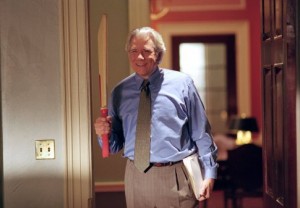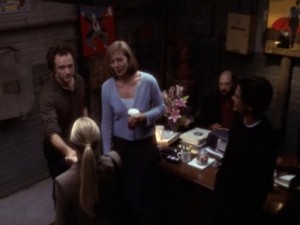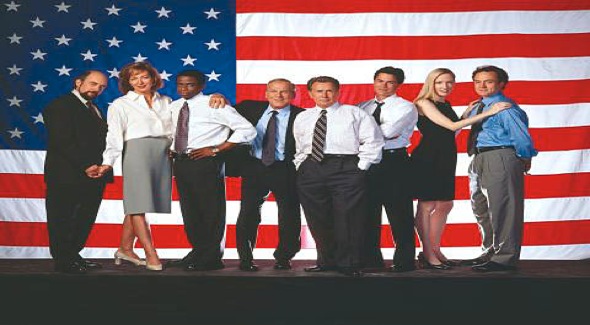AND IT’S SURELY TO THEIR CREDIT
Ainsley Hayes deals with her first week of working in a hostile White House. CJ chases down a disgruntled general. Sam tries convincing Josh to sue the white supremacists behind the men who shot him. Bartlet tries recording the weekly radio address despite several distractions.
If “In This White House” was a setup to the developments in “And It’s Surely to Their Credit,” I get what Sorkin was trying to do. It’s not the best choice, since an episode should stand or fall on its own merits, but it makes “And It’s Surely …” that much stronger. There is a theme to this episode, unlike “In This White House,” and it’s a theme that strikes right at the heart of the series.

This episode is replete with people rattling off trivia to win arguments. When CJ is facing off with the retiring General Barrie, she answers each of his criticisms of the President, and of recent defense strategy, with not just a string of facts but with meaningful insight as well. Sam tries to excite Josh about suing the Klan by delivering a series of precedents (all real, by the way). Abbey forestalls Bartlet’s excitement by launching into a list of historical women whom the U.S. has yet to honor. And there’s a recurring debate over whether a lyric came from Gilbert and Sullivan’s Pirates of Penzance or H.M.S. Pinafore.
GENERAL BARRIE:
Two divisions, the 10th Mountain Division at Ft. Drum and the 1st Infantry in Germany, have been rated C4. That’s the lowest of four possible readiness grades. It means, “Unfit for service.”C.J.: No sir. Again, with all respect, I hate to disagree, but it means unfit for service based on the Pentagon’s “two war” doctrine. It’s based on how fast these divisions would be able to extract themselves from their peacekeeping mission, retrain on home bases, and ship off to a second of two, full-scale Gulf-War-sized conflicts.
In three of these four instances, victory goes to whoever has the best grasp on the trivia at hand. Abbey gets Bartlet to mention women who need to be honored in his radio address. C.J. gets the general to back down, not only answering his points but also leveraging some knowledge about military history to extort his silence. And Sam convinces Lionel Tribby that “He is an Englishman” comes from Pinafore, not Penzance by citing his history with the Princeton Gilbert and Sullivan Society.
Having a more complete knowledge of precedent is the key to victory over your opponents in The West Wing. We see that in a few other places, and will doubtless see it again, but it’s bold here. You prove that you’re right by proving that you know more about the subject than the other guy, and you prove what you know by reciting it at hummingbird speed. He who has the best memory for quotes wins.
This brings me back, as promised, to Bartlet’s rant to the Dr. Laura stand-in at the end of “The Midterms.” Bartlet proves he knows the Bible better than she does by rattling off a number of barbaric punishments, chapter and verse. The implication, unspoken but obvious, is that Exodus and Leviticus are full of lots of monstrous trivia that nobody lives by today. The President wins because he has more data on his side. “That’s how I beat him,” he tells Toby at the end, referring to an earlier political opponent he’s been stressing over.
I’m leaning on this point because it’s a distinctly Sorkin choice. The staffers of the Bartlet administration are heroes because they have facts and precedent on their side. But we could just as easily imagine a staff that was heroic because they disregarded precedent. “To hell with tradition,” Sam might say. “So what if no one’s ever sued the Klan because of a tenuous connection to some lone wolf assassins? Let’s beat a new trail!” It wouldn’t even be that jarring of a story. We’re more accustomed to our heroes doing new things than wrapping themselves in the mantle of the old.
Or let me put it another way. Suppose Leviticus 18:22 said homosexuality was an abomination, but none of the other chapters of Leviticus said anything too bad. Would Dr. Jenna have won that face-off?
But The West Wing isn’t about breaking with tradition. It’s steeped in tradition. The staffers aren’t pioneers; they’re magistrates. They know all the twists and turns of the institution of democracy, and they prove it by keeping every obscure detail at their fingertips.

This, I suspect, is a large part of The West Wing‘s appeal. It tells smart people that their mastery of details is not only valuable, but a sign of goodness. It’s a Kantian ethic: right emerges not from right ends, but from correct action. Correct action – fidelity to the facts; knowing Pentagon readiness standards or Leviticus verses better than anyone – naturally flows into right ends. The categorical imperative tells us to keep our eyes on the path; that way, we’ll know we’re doing the right thing.
We must live and act morally, per Immanuel Kant, not because it makes us feel good but because it is our obligation. Acting to attain pleasure or satisfaction or just the warm certainty of rightness is utilitarianism, the way of Locke and Bentham and J.S. Mill. But doing right simply because it’s the right thing to do, regardless of how it makes us feel, is deontological. We do the right thing not because we derive pleasure from it, but because it is our duty.
Duty is the other major theme of “And It’s Surely …”. When arguing with Ainsley about Penzance, Lionel cites “Penzance or Iolanthe … one of the ones about duty.” “They’re all about duty,” replies Ainsley. This observation pops up more than once in the episode. Gilbert and Sullivan’s musicals are all about duty. They all involve formal societies, whether under the flag of England, Japan or a pirate fleet. The protagonists are torn between their hearts and the obligations of their social status. Fortunately, comic twists at the end allow them to fulfill both (you’re secretly a noble! everyone marries everyone else!).
Ainsley Hayes joins a Democratic White House out of a sense of duty. She feels drawn to the pomp and tradition of American government and will jump at the chance to serve it, even if it’s under an administration she disagrees with. General Barrie claims that it’s his duty to alert the public to “staggeringly dangerous vulnerabilities” in the American defense posture. CJ points out, however, that the General is following his heart, not his duty, and that his own sense of protocol is weak. Everyone argues about and wonders over what their duty entails and how best to live up to it.
And that’s one of the most striking tones of The West Wing. Conservative critics may have struggled with the show due to Sorkin’s liberal politics, but the characters are hardly radical. Nothing they propose is radical. Rather, they spend significant portions of each episode arguing over which of them hews closest to tradition. Toby looks for a legal precedent to justify sending the FBI after the Klan. CJ panics because she thinks she’s leaked grand jury information. And everyone in the White House staff has an opinion on Gilbert and Sullivan.
It’s easy to throw an old framework up against the wall and put a bullet in its head in the name of revolution. It’s hard to work within the system and still get the changes you want. And while yours truly would say that working within the system isn’t always worth it, I still recognize the appeal.

Man, season 2 of Cowboy Bebop sure seems different. I guess I’ll have to watch the show sometime to understand how it made the transition.
This comment isn’t Sorkin enough. Needs more Sorkin.
In reference to the heavy-handed foreshadowing of “count on getting screwed,” The West Wing as a series includes many similar instances of what seems like heavy handed foreshadowing that goes nowhere. Characters express intentions and don’t follow through on them. Ideas that seem important are dropped.
I don’t want to spoil Season 2 and what comes after, so I’ll use an example from the first season. They had a media consultant named Mandy who was something of a B-string character. Around, but not core cast. She and Josh had some history, and in one episode he sent her to Toby to ask about importing a panda from China for an American zoo. Toby explains that Josh did this to embarrass her (somehow), and Mandy asks Toby to help her humiliate Josh. He appears to consider.
And then that’s over. Not only does the panda/Josh/pride/whatever thing never come up again, Mandy never comes up again. She’s just gone. Her character wasn’t really working, so it made sense to drop her. But they did it mid storyline without explanation, and they do it often enough that it became known as sending characters to “Mandyville.”
Certainly, there’s an argument to be made here that this is weak, or at least scattered, writing. But I like it. The White House is the kind of place where people come and go regularly, so a staff member moving on in between episodes doesn’t warrant much discussion. People may *want* to do something, but they may also realize they don’t have the influence/votes/support to actually do it. On The West Wing, individuals and their very clearly expressed intentions are often frustrated. But Sorkin foreshadows their success, not their surrenders.
I also liked this aspect of the show (foreshadowing a plot line that never developed on screen) because it gave the feeling that there was a lot more going on in the White House than just what we saw. As (I assume) with the real White House, there may be hundreds of things going on in a given week — from mundane office pranks to crisis-level emergencies — and no one person (or viewer) could be expected to know the intimate details of all of them.
So The West Wing shows us events from across the spectrum, but it doesn’t even pretend to follow all of them because it can’t, because there’s too much going on. That idea, that the characters always have much more to get done than we see them do, justifies and explains the show’s fast pace (would they have a need to walk-and-talk if they only did what we saw on screen?), the ensemble cast, and dramatic slow downs (if the characters think that a topic is worth sitting down for, then it must be important).
You could argue this is over-the-top and that the viewer could be trusted to assume that work gets done off-camera, but the West Wing didn’t require the viewer to assume that, it showed it happening with the dropped threads. It was just another element that supported the show’s verisimilitude. (And, from a dramatic perspective, it helped alleviate expectations created by a Chekhov’s Gun. If you didn’t know what was going to be dropped, it was tough to guess which issue would rise to become the next crisis–putting the viewer in similar shoes to the characters, who also don’t often know what’s coming next.)
It’s not that Tom lost the election that upsets him and his wife, it’s that he lost the election because the White House has tacitly condemned him as a racist. That’s the kind of stain that doesn’t wash out, especially for a Democrat.
For that matter, I’m not surprised the Bartlett White House was cautious about endorsing him, even though his past is only mildly controversial: they don’t have any black senior staff, their party is vulnerable in Congress, and there’s several points during the course of the show (I think at least once in S1) where they find themselves at odds with the black caucus. They can’t afford a whiff of racial insensitivity.
I didn’t see her warning as foreshadowing, just as an epitaph to this friendship Sam had: it’s over. They hate him now.
That’s the kind of stain that doesn’t wash out, especially for a Democrat.
Do you mean “a Democrat,” as in a member of the fictional Democratic party that exists in this television show? Or do you mean as in actual Democrats in actual Congress? Because overt racism has never been a bar, depending on what district you come from.
they don’t have any black senior staff, their party is vulnerable in Congress, and there’s several points during the course of the show (I think at least once in S1) where they find themselves at odds with the black caucus.
This is interesting to know. Thanks!
In that group photo, what’s that white stuff, paint maybe, spattered all over Danny Tripp’s legs? That’s weird.
That would be a rim light. It’s also visible on the backs of Dana Chase’s calves, only less so, because it’s at a different angle.
Also of possible interest, a recent post on the liberal site ThinkProgress argues that Bartlet wasn’t a very good president. It drew a sharp response from Bartlet himself (or, at least his Facebook alter ego).
**Warning: Spoilers for Seasons 1 through 5**
http://thinkprogress.org/alyssa/2012/02/14/423446/josiah-bartlet-was-a-mediocre-president